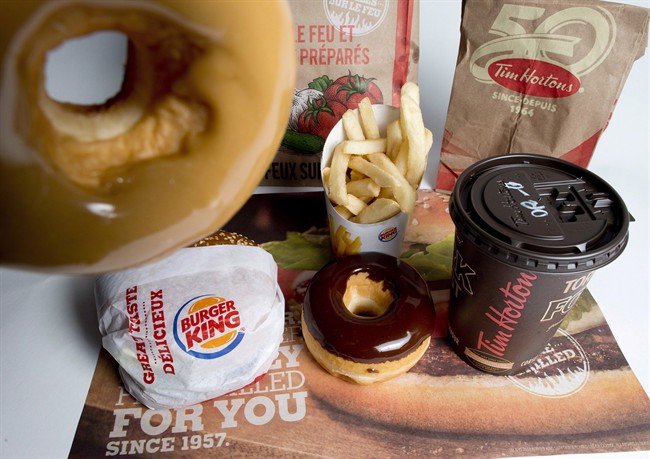Tim Hortons Inc. will be wrung out for maximum profit under the ownership of Burger King Worldwide, Inc., a new report from a left-leaning think tank warned Thursday.

The paper suggests Ottawa intervene to scuttle the deal or win firmer commitments about job protections and investment from the incoming owners, 3G Capital.
“3G Capital has a well-established post-takeover playbook of cost cutting and mass layoffs,” a paper from the Canadian Centre for Policy Alternatives said. “The deal is troubling for our country and for fans of Canada’s coffee chain.”
Tim Hortons responded to the paper on Thursday, saying the coffee chain has “a very different view” of the deal.
‘Commitment to Canada’
The CCPA paper is calling for Industry Canada, the federal department that must approve big foreign takeovers, to carefully review the deal. Company officials say they expect the merger to be rubber-stamped and completed before the end of the year.
But Industry officials must first determine if the takeover is of a “net benefit” to Canada’s interests under foreign investment laws. The Competition Bureau approved the takeover this week, saying the deal wouldn’t harm competition in the fast-food sector.
MORE: Burger King gets go-ahead to gobble up Tim Hortons
To help win approval, Burger King has made a “commitment to Canada” that includes plans to relocate the combined company’s headquarters to Ontario. It’s also committed up to $140 million annually in “enhanced and/or additional commitments” to Tims operations, it has said in filings.
- What is a halal mortgage? How interest-free home financing works in Canada
- Capital gains changes are ‘really fair,’ Freeland says, as doctors cry foul
- Ontario doctors offer solutions to help address shortage of family physicians
- Canada will take bigger economic hit than U.S. if Trump wins election: report
The details from 3G “fall far short,” the CCPA paper counters, suggesting the Brazil-based private equity firm’s track record of sharply reducing operating budgets, stripping assets and lowering staff levels at companies it acquires stands in stark contrast to the pledge.
3G’s last major acquisition was food and ketchup maker H. J. Heinz Co. in late 2013. In June, Heinz shut down its 105-year-old ketchup plant in Leamington, Ont., the single biggest source of employment in the southern Ontario town for decades. About 740 workers lost their jobs.
There are “painful changes ahead for Tim Hortons,” the CCPA paper said.
“We obviously have a very different view,” Scott Bonikowsky, senior vice-president of corporate and public affairs at Tim Hortons, said in an email.
“As we said at the time of our announcement, this transaction will create a new global leader … that will be headquartered and listed in Canada, and that will preserve the independence of the Tim Hortons brand, as well as our traditional levels of community support, restaurant-level jobs and franchisee relationships.”
Obligations to cut?
Burger King has borrowed billions to buy Tim Hortons in a deal valued at $12.5 billion. The purchase is being financed with $10.4 billion in loans taken out by the Miami-based fast-food company.
The towering debt load 3G must pay down, combined with an eye toward generating bigger near-term profits, will pressure every expense at Oakville, Ont.-based Tims, the report said, from headcount to office supplies.
MORE: Should Tim Hortons brace for job cuts?
Marc Caira, Tims’ chief executive who will move to the board of the new company, stated at the time of the deal’s announcement in August it will be “business as usual,” with the Canadian chain taking out full-page newspaper ads stating the same.
But analysts and other experts suggest comments from 3G executives indicate cuts loom behind the scenes.
“There are significant opportunities to achieve meaningful synergies,” Alexandre Behring, a managing director at 3G said in August. Synergy is a common refrain used by business executives to describe cutting away overlapping costs when two companies merge.
The CCPA report said “hundreds” of jobs throughout Tims’ supply chain, as well as head and regional offices, are at risk.
“They’re going to look for synergies, but any changes they make will be completely invisible to the customer,” Ken Wong, a business professor at Queen’s University told Global News after the deal’s announcement.
Franchisee risks
That may not be entirely accurate, others suggest.
The vast majority of Tims’ 3,600 Canadian locations are owned and operated by franchisees, with the Tim Hortons corporation licencing its brand and selling its food and supplies to store owners.
The CCPA and others say 3G could seek to “squeeze” more revenue from its network of franchisees, indirectly leading to potential job losses at the store level, as well, as owners grapple with higher financial commitments owed to 3G.
Gains abroad?
The paper also blasts the strategic rationale that the deal will see Tims expand globally, helping to create jobs and profits for stakeholders back home.
3G’s model at Burger King largely outsources all functions to foreign partners who operate a network of restaurants in a given country. The brand and licencing agreements are what 3G provides foreign operations, and little more.
Far from increasing as Burger King has expanded around the world since 3G’s 2010 takeover, headcount at Burger King’s Miami headquarters has fallen by 50 per cent, the report said.




Comments